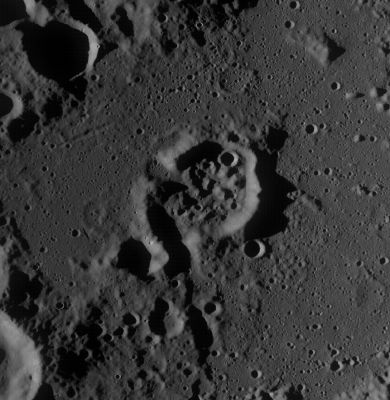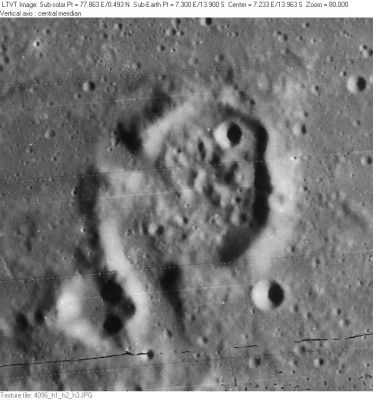Burnham
Contents
Burnham
|
Lat: 13.9°S, Long: 7.3°E, Diam: 24 km, Depth: 0.76 km, Rükl: 45 | |
Right: LO-IV-096H The 3-km crater on the northern floor of Burnham is Burnham K. 4-km Burnham L is just outside the rim at 5 o’clock and the less regular 9-km Burnham F is at 7 o’clock.
Images
LPOD Photo Gallery Lunar Orbiter Images Apollo Images
- The oddly shaped formation Burnham was also captured on several frames made by Apollo 16's south-looking mapping/metric Fairchild camera, such as frame AS16-M-0706, in which Burnham is noticeable a little bit below and to the left of the frame's centre.
- Research: Danny Caes.
Maps
(LAC zone 77C3) LAC map Geologic map LM map
Description
Description: Wikipedia
Additional Information
- Depth data from Kurt Fisher database
Westfall, 2000: 0.76 km - The shadows from the east rim in LO-IV-096H suggest Burnham is at least 500-700 m deep. - JimMosher
Nomenclature
- Sherburne Wesley Burnham (December 12, 1838 - March 11, 1921) was an American astronomer. He worked at Yerkes Observatory. All his working life, he served during the day as a court reporter and was an amateur astronomer, except for four years as a full-time astronomer at Lick Observatory. For more than fifty years he spent all his free time observing the heavens, principally concerning himself with binary stars. Friedrich Georg Wilhelm von Struve and Otto Wilhelm von Struve had catalogued a good number of binary stars working at the Observatories of Dorpat and Pulkovo and using 23- and 38-cm telescopes. During the 1840s it was believed that essentially all the binary stars visible to the instruments of the day had been discovered. Burnham, with his 15-cm instrument, found 451 new ones from 1872 to 1877. The quality of his work opened the doors of observatories for him and he had access to more powerful instruments at Lick, Yerkes and other observatories. He is credited with having discovered 1340 binary stars.
- According to Whitaker (p. 226), this name was introduced by Krieger and König.
- Robert Burnham, Jr. (1931 - 1993), author of the classic three-volume Burnham's Celestial Handbook (Dover publications). See also the new online alphabetic index of names for Burnham's Celestial Handbook. - DannyCaes May 27, 2015
LPOD Articles
Somewhere over the Rainbow (Burnham and its environs during the local pre-sunset hours).
Bibliography
S. W. Burnham in the Sourcebook Project (William R. Corliss)
- In Mysterious Universe, a handbook of astronomical anomalies (1979) :
(articles in which S.W.Burnham is mentioned)
- Page 56: Supposed Discovery of Vulcan (Lewis Swift, Observatory, 1878).
- Page 452: Observations of the planet Jupiter and his Satellites during 1890 (E.E.Barnard, Monthly Notices of the Royal Astronomical Society, 1891).
- Page 455: On the Phenomenon of the Transit of the First Satellite of Jupiter (E.E.Barnard, Monthly Notices of the Royal Astronomical Society, 1892).

